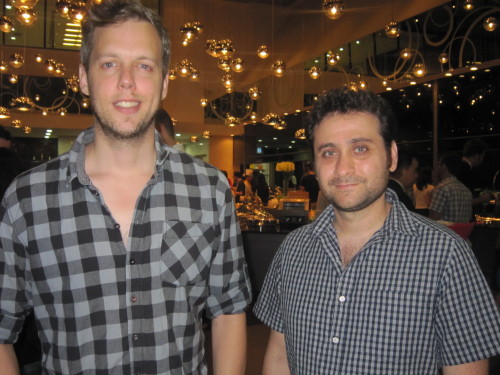Country’s new talent connects at PiFan showcase
Israel and Korea may not share a common tongue, but it was the international language of film that shone through at the Israeli Film Reception on Wednesday, held in cooperation with the 15th Puchon International Fantastic Film Festival.
Two Israeli films showcased at PiFan were celebrated at the event: “Rabies,” a horror written and directed by Navot Papushado and Aharon Keshales, and “Guest,” a dark restaurant-set satire by Roy Krispel.
Addressing the event held in conjunction with the Israeli embassy, PiFan director Kim Young-bin highlighted the historical similarities between Israel and Korea, making reference to their common struggle to protect their peoples.
“It is very meaningful to be able to host the Israeli film especially since both Israel and Korea share a history … of protecting the dignity and identity of their people,” he told the gathering in Bucheon.
Israel and Korea may not share a common tongue, but it was the international language of film that shone through at the Israeli Film Reception on Wednesday, held in cooperation with the 15th Puchon International Fantastic Film Festival.
Two Israeli films showcased at PiFan were celebrated at the event: “Rabies,” a horror written and directed by Navot Papushado and Aharon Keshales, and “Guest,” a dark restaurant-set satire by Roy Krispel.
Addressing the event held in conjunction with the Israeli embassy, PiFan director Kim Young-bin highlighted the historical similarities between Israel and Korea, making reference to their common struggle to protect their peoples.
“It is very meaningful to be able to host the Israeli film especially since both Israel and Korea share a history … of protecting the dignity and identity of their people,” he told the gathering in Bucheon.

But for others, the evening was all about film.
For Papushado and Keshales, the Israeli directing duo behind “Rabies,” being invited to PiFan had special significance. Korean cinema, they said, has been a major influence on their filmmaking.
“It all started with Park Chan-wook’s ‘Oldboy.’ Everything started with him and then we kind of looked back to his earlier films and from then we’ve seen probably all of them,” said Papushado.
But Park is just one of a number of Korean directors they admire.
“Kim Ji-woon (who directed) ‘I Saw the Devil,’ the last one we saw. ‘Bittersweet Life,’ we saw, we very much liked (and) ‘The Good, the Bad and the Weird.’ And also the director of ‘Memories of Murder’ (Bong Joon-ho) who also did ‘Mother,’” said Keshales.
And just what is it they appreciate about the Korean approach to filmmaking?
“They go against convention. They really love to start their films where other American films end. They catch the killer in the first fifteen minutes and then the story is just starting. Hollywood is like usually good, bad, white, black. But Korean films are going through all kinds of emotion in one scene,” Keshales said.
Such was his appreciation for Korean cinema, Keshales used Korean films to teach his students in his former occupation as a lecturer in film.
“Aharon was a professor at university and he showed Korean films, as like a mandatory thing to watch when you took his classes,” said Papushado.
Just as Korean cinema has had a global impact, the directors want to spread the influence of Israeli cinema outside their country.
“I think there was only one Israeli film shown here,
‘Waltz with Bashir,’ and this is the second one. So they had like a war film animation and a horror film to learn about Israel from the movies, so it’s not a good thing and hopefully they’ll bring a lot more movies to Koreans,” Keshales said.
“But they know a lot about Israel,” Papushado added.
“I mean this is a country on the other side of the world, but they know a lot about Israel. They even know a few words in Hebrew, which we’d never expected.”
Both were blown away by the reaction they got from the PiFan audience at the screenings of their film.
“They have amazing questions. They really digged the film. We thought maybe because of the barriers in the language they wouldn’t understand the subtleties and comedy. But they nailed it to the last bit. The movie really does work in every language,” said Papushado.
Off next to Fantasia International Film Festival in Montreal, the pair is currently working on their next film, a twist on the kidnap thriller.
While films such as “Rabies” and “Guest” are bridging the worlds of Israeli and Korean film organically, the future for cooperation between the Korean industry and those of other countries also looks promising, according to Christian Hallman, coordinator for the European Fantastic Film Festivals Federation, who attended Wednesday’s event.
“Right now the federation is looking at a program for co-productions. And since we have supporting members in Korea and also in North America, we are looking at creating a coproduction platform between Europe, Korea, Europe, U.S. And we will know at the beginning of next year how that develops, but we are in talks with PiFan about it. It takes the cooperation we have to a new level,” said Hallman.
The European Fantastic Film Festivals Federation represents some 20 festivals, including PiFan, working to promote the European fantasy film industry.
By John Power (john.power@heraldcorp.com)








![[Graphic News] More Koreans say they plan long-distance trips this year](http://res.heraldm.com/phpwas/restmb_idxmake.php?idx=644&simg=/content/image/2024/04/17/20240417050828_0.gif&u=)
![[KH Explains] Hyundai's full hybrid edge to pay off amid slow transition to pure EVs](http://res.heraldm.com/phpwas/restmb_idxmake.php?idx=644&simg=/content/image/2024/04/18/20240418050645_0.jpg&u=20240419100350)





![[From the Scene] Monks, Buddhists hail return of remains of Buddhas](http://res.heraldm.com/phpwas/restmb_idxmake.php?idx=652&simg=/content/image/2024/04/19/20240419050617_0.jpg&u=20240419175937)

![[KH Explains] Hyundai's full hybrid edge to pay off amid slow transition to pure EVs](http://res.heraldm.com/phpwas/restmb_idxmake.php?idx=652&simg=/content/image/2024/04/18/20240418050645_0.jpg&u=20240419100350)

![[Today’s K-pop] Illit drops debut single remix](http://res.heraldm.com/phpwas/restmb_idxmake.php?idx=642&simg=/content/image/2024/04/19/20240419050612_0.jpg&u=)